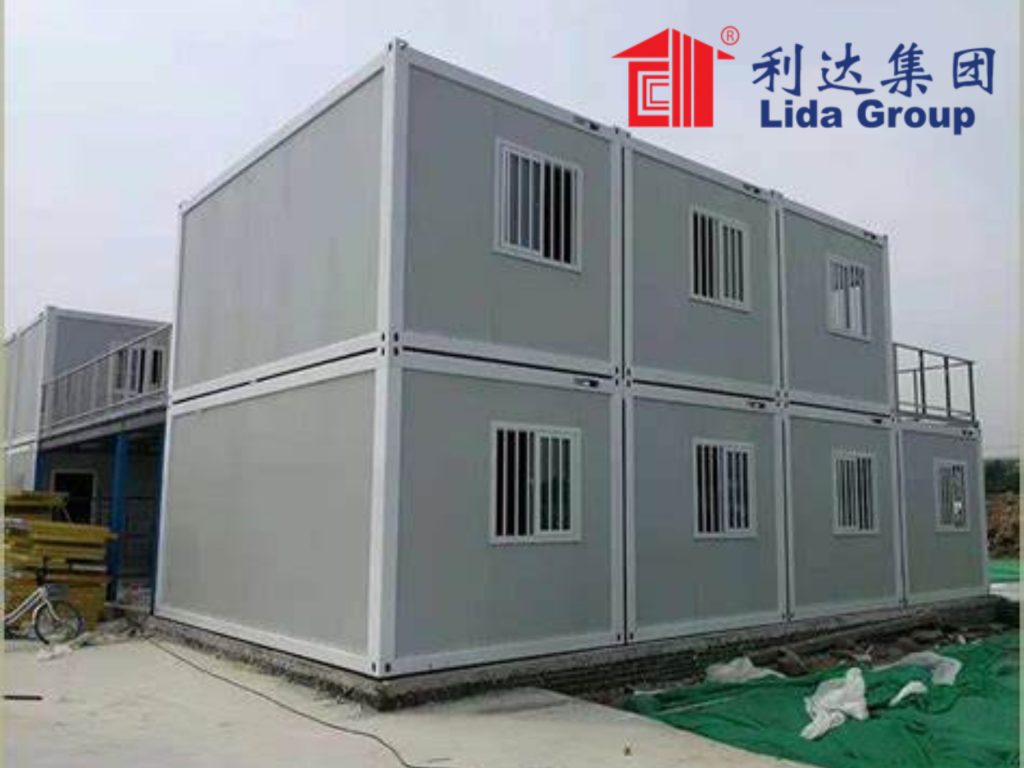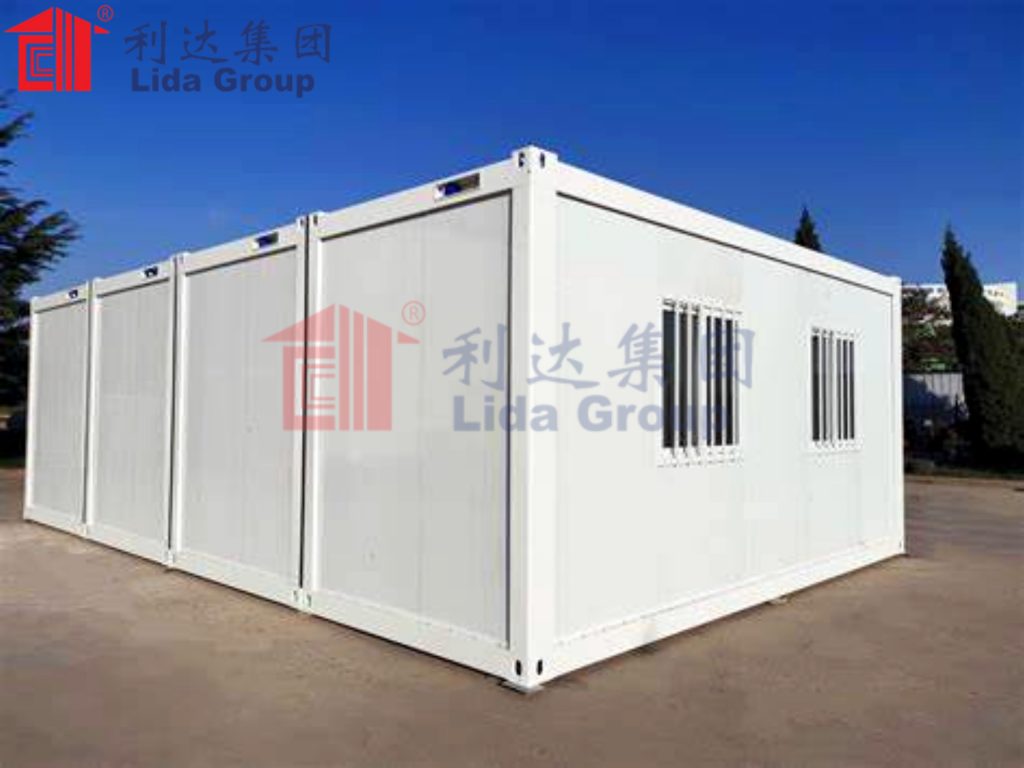In the early hours of Tuesday morning, a four-alarm fire broke out at a construction site on the outskirts of Shanghai where a prototype multi-story apartment building was being built utilizing a unique modular construction method. The prototype building, which was being developed by Shanghai-based Lida Group, aimed to prove the feasibility and cost-effectiveness of constructing mid-rise housing using standardized steel shipping containers as the primary structural elements. Unfortunately, the fire caused significant damage before firefighters were able to bring it under control, essentially destroying the prototype and setting back the development of the innovative new construction system.
Lida Group is a real estate and engineering firm that has been exploring new modular and prefabricated construction techniques as alternatives to traditional cast-in-place concrete construction for multi-unit residential buildings. Their design for the prototype apartment block called for stacking repurposed steel shipping containers to form the building’s structural frame and exterior walls. Rather than pouring concrete at the job site, the design envisioned welding together standardized steel containers to act as prefabricated structural cassettes. These cassettes would then be lifted into place by crane to assemble the building one level at a time.
In addition to being faster to construct compared to concrete, the use of standardized shipping containers as the basic structural building blocks was intended to dramatically reduce waste at construction sites. With their modular dimensions and durable steel construction, shipping containers can be reused, recycled, or returned to the logistics industry at the end of the building’s lifespan. The design also aimed to lower overall costs through greater precision and reduced labor needs compared to cast-in-place building methods. If proven successful, Lida Group hoped their new system could provide an affordable alternative for rapidly constructing middle-income housing across China and other developing countries facing severe shortages.

Construction on the prototype six-story building began last fall on a vacant lot next to Lida Group’s research facilities. Over the following months, workers carefully welded together groups of repurposed shipping containers to form structural cassettes matching the building’s floor plans. A tower crane was then used to lift the 12-foot-wide by 40-foot-long cassettes into place one level at a time to construct the prototype structure from the ground up. By late spring, the building’s steel skeleton was nearing completion with installation of the final cassettes for the sixth and top floor scheduled to begin within the next couple weeks.
In the early morning hours of Tuesday, a night watchman on patrol within the construction site noticed flames coming from the top floor of the nearly finished prototype building. He immediately called the fire department at around 3 a.m., but by the time the first engines arrived only 10 minutes later the entire top floor was fully engulfed. Strong gusts caused the flames to quickly spread downward, and the fire soon consumed the entire six-story structure. Though over 100 firefighters battled the intense heat throughout the night, the prototype apartment block constructed entirely from welded steel shipping containers was lost to the flames. No injuries were reported as the site had been evacuated once the fire was discovered.
The cause of the fire is still under investigation by Shanghai police and fire investigators. However, initial findings suggest it may have been accidental rather than deliberately set. Workers had been doing welding and other final work to the steel frames even late into the night shift before the fire. Investigators believe faulty electrical connections or equipment, combustible materials left too close to ongoing work, or some other aspect of the construction activities themselves may have unintentionally sparked the blaze. Due to the highly flammable nature of the steel and its open web framing design, the fire was able to spread rapidly once ignited with few internal barriers to contain it.

Lida Group executives expressed great disappointment that the fire destroyed their prototype building just as it neared completion. They had hoped the successful construction of the model structure would help prove the viability and cost advantages of their new modular construction methodology utilizing stacked shipping containers. Extensive testing of the prototype’s structural integrity, energy efficiency, noise and vibration performance, and other factors was planned once it was finished to generate data for design certification and approval processes. The fire has now set back that timeline significantly.
While the destruction of the prototype is a major setback, Lida Group leaders remained committed to continuing development of their innovative construction system. They pointed out that no lives were lost in the accidental fire, and the durability of shipping container structures was actually demonstrated by withstanding a fully involved blaze for hours without immediate collapse. Moving forward, the company will analyze what factors may have contributed to the fire’s rapid spread within the prototype building. They also plan to implement additional safety procedures during construction to help prevent such accidents.
In the meantime, Lida Group will begin reconstruction of a new and improved prototype structure on their research campus later this year. Lessons from the first attempt will be applied to strengthen fire safety built into the system. Once complete, the rebuilt prototype will undergo the same testing and certification evaluations delayed by the earlier fire. If successful, Lida Group aims to start licensing and marketing their modular construction methodology internationally in 2023. They believe standardized steel structural cassettes offer a cheaper and faster building solution to housing shortages around the world.
The destroyed prototype was a setback, but the underlying concepts of the innovative construction system remained valid according to independent engineering experts. Prefabricated modular construction using repeated standardized elements offers many advantages over conventional building techniques. When rebuilt with enhanced safety, the new prototype may help prove shipping container structural cassettes are cost-effective building blocks for dense urban housing. Though a freak accident, the fire has not diminished Lida Group’s belief that their unique methodology can help address shortfalls in affordable housing supply if proven reliable and certified for multi-story buildings. They hope to move forward soon with a second prototype demonstrating those capabilities.
In summary, a four-alarm fire in Shanghai destroyed a nearly complete prototype apartment building that was testing an innovative construction system developed by Lida Group. Rather than conventional cast-in-place concrete frames, the prototype structure was assembled from repurposed steel shipping containers welded together into structural cassettes. This represented a promising new modular building methodology with benefits for reducing construction waste and costs compared to traditional methods. While the accidental fire was a major setback, Lida Group remains dedicated to continuing development through reconstructing an improved second prototype structure implementing enhanced fire safety. They believe the viability of their system is still intact if the next iteration is successful. With potential to help address shortfalls in affordable urban housing, the underlying concepts demonstrated resiliency worth further exploration despite the setback from the destructive blaze.

Related news
-
Lida Group Factory Holds Grand Opening of New Automated Welding Lines to Meet Demand for Egalitarian Steel Housing Projects
2023-12-20 10:37:58
-
Lida Group Unveils Plans to Engineer Standardized Steel Container Modules into Multifamily Developments Affordable for Low-Income Communities
2023-12-20 17:23:25
-
Town Approves Lida Group's Steel Structure Design for Vertical Expansion of Overcrowded Affordable Housing Development
2023-12-18 17:51:05
contact us
- Tel: +86-532-88966982
- Whatsapp: +86-13793209022
- E-mail: sales@lidajituan.com


